Better Outcomes for Stroke Victims. With CT Perfusion, Time Is on Our Side.
A growing number of health organizations are making computed tomographic perfusion (CTP) a critical part of their stroke intervention protocols.

Remote radiologist jobs with flexible schedules, equitable pay, and the most advanced reading platform. Discover teleradiology at vRad.

Radiologist well-being matters. Explore how vRad takes action to prevent burnout with expert-led, confidential support through our partnership with VITAL WorkLife. Helping radiologists thrive.

Visit the vRad Blog for radiologist experiences at vRad, career resources, and more.

vRad provides radiology residents and fellows free radiology education resources for ABR boards, noon lectures, and CME.

Teleradiology services leader since 2001. See how vRad AI is helping deliver faster, higher-quality care for 50,000+ critical patients each year.

Subspecialist care for the women in your community. 48-hour screenings. 1-hour diagnostics. Comprehensive compliance and inspection support.

vRad’s stroke protocol auto-assigns stroke cases to the top of all available radiologists’ worklists, with requirements to be read next.

vRad’s unique teleradiology workflow for trauma studies delivers consistently fast turnaround times—even during periods of high volume.

vRad’s Operations Center is the central hub that ensures imaging studies and communications are handled efficiently and swiftly.

vRad is delivering faster radiology turnaround times for 40,000+ critical patients annually, using four unique strategies, including AI.
.jpg?width=1024&height=576&name=vRad-High-Quality-Patient-Care-1024x576%20(1).jpg)
vRad is developing and using AI to improve radiology quality assurance and reduce medical malpractice risk.

Now you can power your practice with the same fully integrated technology and support ecosystem we use. The vRad Platform.

Since developing and launching our first model in 2015, vRad has been at the forefront of AI in radiology.

Since 2010, vRad Radiology Education has provided high-quality radiology CME. Open to all radiologists, these 15-minute online modules are a convenient way to stay up to date on practical radiology topics.

Join vRad’s annual spring CME conference featuring top speakers and practical radiology topics.

vRad provides radiology residents and fellows free radiology education resources for ABR boards, noon lectures, and CME.

Academically oriented radiologists love practicing at vRad too. Check out the research published by vRad radiologists and team members.

Learn how vRad revolutionized radiology and has been at the forefront of innovation since 2001.

%20(2).jpg?width=1008&height=755&name=Copy%20of%20Mega%20Nav%20Images%202025%20(1008%20x%20755%20px)%20(2).jpg)

Visit the vRad blog for radiologist experiences at vRad, career resources, and more.


Explore our practice’s reading platform, breast imaging program, AI, and more. Plus, hear from vRad radiologists about what it’s like to practice at vRad.

Ready to be part of something meaningful? Explore team member careers at vRad.
3 min read
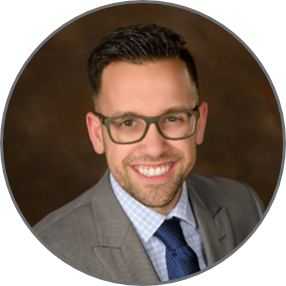 Chris Garcia
:
June 26, 2018
Chris Garcia
:
June 26, 2018
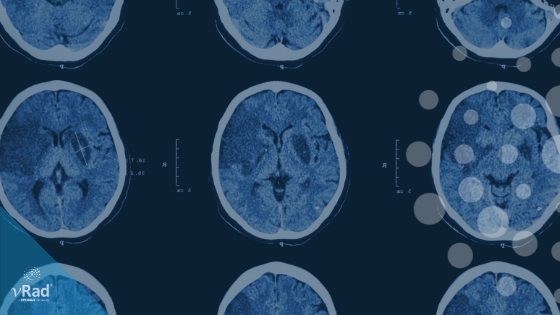
Radiologists must design protocols that enable clinical partners to achieve stroke certification. Medicine is at the forefront of a revolution in stroke diagnosis and treatment, as my colleague Dr. Dym elucidated in 2018.
Independent certification empowers the care organizations that will lead the fight against the disease, helping ensure staffs are armed with the best tools available today and over the long term. Imaging is a vital component in every stroke center toolbox.
Every medical certification program is about collective knowledge and expertise supporting proven guidelines and best practices. In the digital age of artificial intelligence and precision medicine, the tenets of certification promise exponential advancements in care for virtually every disease. Active involvement in certification programs is a powerful way to engage clinical staffs and keep them apprised of changing standards and guidelines.
With regard to stroke care, these changes will be substantial over the foreseeable future. Early results from ongoing trials – such as the DAWN Trials – are redefining stroke victim diagnosis and care practices, including much broader opportunities for additional neuroradiological studies to help improve patient outcomes.
Stroke certified care organizations promote community confidence in the quality and safety of their treatment and service offerings, and attract increased patient volumes based on emergency medical service protocols.
A number of qualified organizations offer stroke care certification programs. All are driven to improve the lives of stroke victims by engaging care providers in best practices that ensure better outcomes. Amen to that.
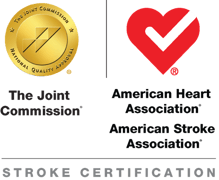
To help ensure vRad protocols and performance meet stroke certification standards, we maintain an ongoing relationship with The Joint Commission. Their advanced certifications for stroke centers are offered in collaboration with the American Heart Association/American Stroke Association (AHA/ASA), through which they certify the most stroke centers in the U.S.
The Joint Commission offers four advanced levels of stroke certification, ranging from stroke-focused emergency facilities to long term complex stroke care providers.
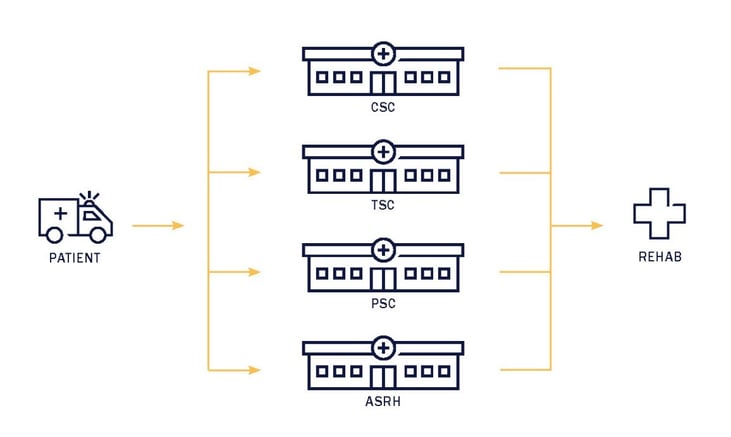
Illustration courtesy of the Joint Commission
Detailed requirements for hospital systems may be found through The Joint Commission website.
Currently, The Joint Commission certifies approximately 45 ASRH, 1,100 PSC and 153 CSC hospital systems. We expect the total number of certified stroke centers to grow substantially in the coming years. Additionally, many hospitals are pursuing higher-level certifications, to better patient care while securing competitive advantage in their markets.
Imaging is a fundamental component of certification. At every certification level, hospitals must demonstrate the ability to deliver a timely, accurate non-contrast head CT in emergent situations. At more comprehensive levels, hospitals need immediate access to neuroradiologists capable of advanced reporting, such as contrast CTA or perfusion studies.
vRad is immersed in the diagnostic imaging standards, guidelines and performance measurements required at each level of Joint Commission AHA/ASA certification – from emergency facilities working toward ASRH certification to hospital systems pursuing CSC accreditation. Our comprehensive tracking and reporting provides all necessary imaging-related documentation to satisfy Joint Commission requirements at every level.
Teleradiology is playing a critical role in making certification accessible to hospitals.
Hundreds of smaller and rural hospitals were previously challenged to meet diagnostic imaging requirements. For many outlying care facilities and emergency centers, it is simply impractical to have qualified specialists on site 24/7. vRad radiology services can provide immediate access to one of our 75+ neuroradiology subspecialists around-the-clock, helping hospitals meet even the most stringent certification requirements for stroke imaging.
For larger hospital systems, we can effectively augment the in-house radiologists’ workflow, ensuring certification standards are met during off-peak hours or in the event of a spike in demand. Each hospital can be prepared to deliver timely, accurate studies under virtually any circumstances without compromising patient care. vRad currently provides stroke services to over 1,400 facilities including 140 Stroke Centers.
Ultimately, for each one of nearly 800,000 stroke victims every year, certifications promise to significantly improve the quality of care regardless of where and when onset occurs.
Learn More About Stroke Imaging Success in the New DAWN Paradigm
Back to Blog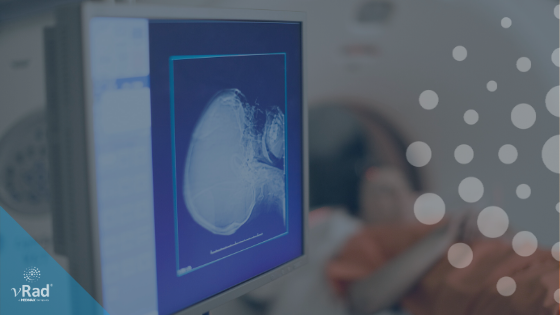
A growing number of health organizations are making computed tomographic perfusion (CTP) a critical part of their stroke intervention protocols.

May is both Stoke and Trauma awareness month. In recognition of this, we will be publishing a series of 3 posts covering: Stroke information and our...

Today is our third and final post in deference to Stroke and Trauma Awareness Month:
vRad (Virtual Radiologic) is a national radiology practice combining clinical excellence with cutting-edge technology development. Each year, we bring exceptional radiology care to millions of patients and empower healthcare providers with technology-driven solutions.
Non-Clinical Inquiries (Total Free):
800.737.0610
Outside U.S.:
011.1.952.595.1111
3600 Minnesota Drive, Suite 800
Edina, MN 55435